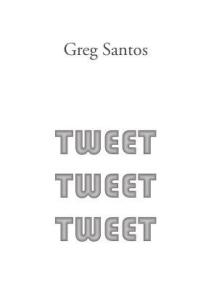‘TWEET TWEET TWEET’ by Greg Santos
-Reviewed by Christopher Crawford–
Greg Santos’ Corrupt Press chapbook is named TWEET TWEET TWEET. The clue is in the title and this is a mixed bag of whimsical musings much as if the poet has used the quotidian random associations we all make to construct his lighthearted poems.
Many of the poems here refer to the fact that they are poems, which can seem playful, irritating or a massive no-no depending on your point of view.
Consider ‘To Whom It May Concern’, short enough to quote in its entirety, typical enough for the chapbook to highlight a concern about TWEET TWEET TWEET as a whole:
‘I went to the grocery store today.
I made the man at the grocery store nervous.
My mom called me.
No one cares about poetry.
Probably going to die alone.
I want to write a poem with you’.
So what? True, thoughts like these pass through this reviewer’s head regularly but only on days when I bore even myself. There is no music here, no originality or freshness. Where is the attention to the musical relationship the words form with each other? It all seems a bit flat, except for the second line which gives us a little respite from the monotonous voice.
Other poems set out from a moment of imagination only to dive bomb into the ground when their wings snap off.
‘While munching on an apple and daydreaming about hydraulic pumps, Leonardo
witnessed a falcon divebombing a smaller bird and instantly became obsessed with
flying’.
The poem goes on to speak about Leonardo speaking to family members in a bird-voice ‘Caw caw caw’, before ending:
‘“Squawk,” he said closing his eyes, stepping off the cliff, and swooping into history;
unsuccessfully testing the world’s first flying machine’.
A poem, literally, that is going nowhere or nowhere very interesting. And that is the problem with the chapbook. It is all very well being whimsical and lighthearted in approach but when all is said and done there must be a heart to sink one’s teeth into or we come away with an empty belly.
From a total of 22 poems, 10 of them mention poets or the poem itself which is being written. Who is the judge of how much is too much? I’m going to say ten poems from twenty-two is too much for me.
Santos tries to make his musings fun, no bad thing, here is ‘I am a Bird and I Love Poets’:
‘I am a bird
and I love
poets
They look
so tiny
from up
here’.
There’s something here of William Carlos Williams’ thoughtful, almost bashful phrasing from ‘This Is Just To Say’ and a nice mixing of viewpoints that seems fresh (with a little nod to ants who aren’t mentioned) although it is a pity one whole stanza (and there are only two) is a straight repetition of the title. It lends itself to the feeling Santos is struggling to find something of substance to say.
In ‘It is Snowing in Paris’ the couplets please the eye and the imagery and phrasing are married to the form. It is one of the better poems in the chapbook:
‘Charcoal roasted chestnuts glow,
Incandescent bulbs on the verge of exploding.
Wayward snowflakes
Rip through the heavens like tiny white meteors
Parisians whip their umbrellas open in a mad rush
Force-fields to keep the snowflakes at bay.
The snow is terrible but nothing like back home
Where the bitter cold squeezes your soul like a vice
I keep my soul in a fur-lined case in the boreal wastes of Canada’.
The poem starts well with unusual imagery and energy and has a thought-provoking and pleasing last line but again is let down by what seems to be a lack of full effort from the poet, especially in the fourth stanza with easy associations spoiling the effect of the weirder preceding associations. Cold…what kind of cold? Bitter. Squeezes… like a what? What about vice? Ok, why not? ‘Squeezes…like a vice’ it is. He also manages to squeeze the word ‘soul’ into the poem twice and it is a nine line poem.
Here’s the problem: if you are going to write very short poems, they should be working pretty damn hard to say something, there is little excuse for boring the reader. The poems can show how hard they’re working or hide it from view but they should lift a finger.
Poets like Philip Whalen, and Laurence Ferlinghetti (to whom Santos gives a nod in ‘A Versailles of The Mind’) have walked us through such meanderings in fresher, and behind all the fun, more serious ways.
In the age of Facebook, Twitter, fast-moving advertising and want-it-all-now-and-in an-easy-to-swallow-form, where are the serious things that need saying? Are these forms even compatible with the most important hopes and ambitions of the individual or are we diluting ourselves and each other with the mass communication of mindless frippery these social networks encourage? Must poems always deal with the most serious matters of the human condition? No, of course not but poems are perhaps the greatest means we have for exploring the great themes in ways less-or-more serious and it is easy to come away disappointed if the poet glides through his work at cruise altitude.
Greg Santos is finding his way through these questions and coming up with very mixed levels of success. Let’s see what the results of these experiments end up being in the future.



